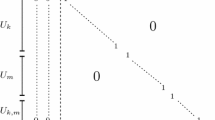Abstract
The Knapsack Sharing Problem (KSP) is an NP-Hard combinatorial optimization problem, admitted in numerous real world applications. In the KSP, we have a knapsack of capacity c and a set of n objects, namely N, where each object j, j = 1,...,n, is associated with a profit p j and a weight w j. The set of objects N is composed of m different classes of objects J i, i = 1,...,m, and N = ∪m i=1 J i. The aim is to determine a subset of objects to be included in the knapsack that realizes a max-min value over all classes.
In this article, we solve the KSP using an approximate solution method based upon tabu search. First, we describe a simple local search in which a depthparameter and a tabu list are used. Next, we enhance the algorithm by introducing some intensifying and diversifying strategies. The two versions of the algorithm yield satisfactory results within reasonable computational time. Extensive computational testing on problem instances taken from the literature shows the effectiveness of the proposed approach.
Similar content being viewed by others
References
J.R. Brown, “The knapsack sharing,” Operations Research, vol. 27, pp. 341–355, 1979.
J.R. Brown, “Solving knapsack sharing with general tradeoff functions,” Mathematical Programming, vol. 51, pp. 55–73, 1991.
P. Chu and J.E. Beasley, “A genetic algorithm for the multidimensional knapsack problem,” Journal of Heuristics, vol. 4, pp. 63–86, 1998.
A. Freville and G. Plateau, “The 0-1 bidimensional knapsack problem: Toward an efficient high-level primitive tool,” Journal of Heuristics, vol. 2, pp. 147–167, 1997.
P.C. Gilmore and R.E. Gomory, “The theory and computation of knapsack functions,” Operations Research, vol. 13, pp. 879–919, 1966.
F. Glover, “Future paths for integer programming and links to artificial intelligence,” Computers and Operations Research, vol. 13, pp. 533–549, 1986.
F. Glover and M. Laguna, Tabu Search, Kluwer Academic Publishers: Boston, MA, 1997.
P. Hansen, “The steepest ascent mildest descent heuristic for combinatorial programming,” Presented at the Congress on Numerical Methods in Combinatorial Optimization, Capri, Italy, 1986.
M. Hifi and S. Sadfi, “The knapsack sharing problem: An exact algorithm,” Journal of Combinatorial Optimization, vol. 6, pp. 35–45, 2002.
T. Kuno, H. Konno, and E. Zemel, “A linear-time algorithm for solving continuous maximum knapsack problems,” Operations Research Letters, vol. 10, pp. 23–26, 1991.
H. Luss, “Minmax resource allocation problems: Optimization and parametric analysis,” European Journal of Operational Research, vol. 60, pp. 76–86, 1992.
S. Martello and P. Toth, Knapsack Problems: Algorithms and Computer Implementation, John Wiley: New York, 1990.
S. Martello and P. Toth, “Upper bounds and algorithms for hard 0-1 knapsack problems,” Operations Research, vol. 45, pp. 768–778, 1997.
J.S. Pang and C.S. Yu, “A min-max resource allocation problem with substitutions,” European Journal of Operational Research, vol. 41, pp. 218–223, 1989.
D. Pisinger, “A minimal algorithm for the 0-1 knapsack problem,” Operations Research, vol. 45, pp. 758–767, 1997.
M. Syslo, N. Deo, and J. Kowalik, Discrete Optimization Algorithms, Prentice-Hall, 1983.
C.S. Tang, “A max-min allocation problem: Its solutions and applications,” Operations Research, vol. 36, pp. 359–367, 1988.
T. Yamada and M. Futakawa, “Heuristic and reduction algorithms for the knapsack sharing problem,” Computers and Operations Research, vol. 24, pp. 961–967, 1997.
T. Yamada, M. Futakawa, and S. Kataoka, “Some exact algorithms for the knapsack sharing problem,” European Journal of Operational Research, vol. 106, pp. 177–183, 1998.
Author information
Authors and Affiliations
Rights and permissions
About this article
Cite this article
Hifi, M., Sadfi, S. & Sbihi, A. An Efficient Algorithm for the Knapsack Sharing Problem. Computational Optimization and Applications 23, 27–45 (2002). https://doi.org/10.1023/A:1019920507008
Issue Date:
DOI: https://doi.org/10.1023/A:1019920507008




